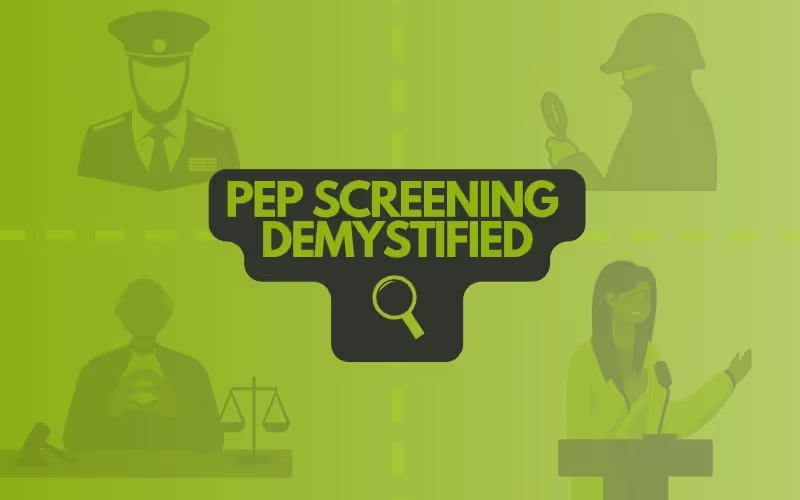
PEP Screening Demystified: 3 Tangible Use Cases Explained
Politically exposed person (PEP) screening is a rapidly growing service. Why? Because companies - with anti-money laundering regulations to comply with - need to know when a customer is a PEP. It sounds simple enough. But the reality is that screening for PEPs can be complex. A common question is: In what situations should a company perform a check? This PEP screening demystified guide will reveal everything you need to know.
But before diving into the tangible use cases, we must remind ourselves about PEPs and what PEP screening is.
{{snippets-guide}}
What Are PEPs?
An individual that is 'politically exposed' is known as a PEP. But what does it mean to be politically exposed? Aren't we all, in some way, exposed to politics?
The 'PEP' acronym is vague - it may also contribute to the mystery surrounding PEP screening.
So let's put this into plain English. It all comes down to this: money. A PEP isn't only exposed to politics. They are also directly exposed to governmental budgets and bank accounts with tax-payers' cash that doesn't belong to them.
'Influence' is also a keyword in defining PEPs. Why? Because they are often the middle person between where the money sits and how it's spent (e.g., with contractors). Here are some real-world examples of PEPs:
- Politicians
- Civil Servants
- Military Personnel
- People in Judicial Roles
- Political Party Members
- Executives at State-Owned Corporations
And the following is a fact - PEPs are human. Although most are law-abiding professionals, the temptation to line pockets by stealing from state coffers or taking bribes exists.
But why is this important to your business?
It matters because PEPs (the ones that steal state funds or receive bribes to direct tax-payers money to certain contractors) need to clean their ill-gotten money. Therefore, they are categorised as high-risk money launderers.
PEP screening, or PEP checking as it's also known, is the process where companies and organizations can assess if a potential customer, an existing client - perhaps even a proposed consultant - is a PEP. And if they are, that's okay. But it does mean the requirement of Enhanced Due Diligence (EDD).
You can learn more in this sanctions.io guide: What Are Politically Exposed Person (PEP) Checks? A Beginner's Guide.
What Is PEP Screening?
PEP screening refers to the process of identifying whether an individual is a Politically Exposed Person (PEP) - someone who holds, or has held, a prominent public position and may therefore present a higher risk of being involved in bribery, corruption, or other financial crimes. This can include heads of state, senior government officials, military officers, judges, and executives of state-owned enterprises, as well as their family members and close associates. Because PEPs are more vulnerable to abuse of power for personal gain, financial institutions and regulated businesses are legally required in many jurisdictions to screen for PEP status during customer onboarding and throughout the business relationship as part of their anti-money laundering (AML) obligations.
PEP screening typically involves using specialised tools or databases to check customer information against global lists of known PEPs. These tools often rely on fuzzy matching to account for variations in names, languages, and spellings, and they may also screen for aliases and connections to high-risk individuals. Screening should be conducted at the onboarding stage and repeated regularly, particularly when the customer’s circumstances change. If a match is found, organisations must carry out enhanced due diligence (EDD), which may include verifying the individual’s source of wealth and monitoring their transactions more closely. Automated screening solutions, such as those provided by sanctions.io, help streamline this process by offering real-time alerts and integrations with existing compliance systems, allowing teams to manage risk more effectively and stay compliant with regulatory requirements.
We will now delve into some tangible, real-world examples of PEP screening in action.
Number 1: Onboarding New Clients
The most common use case for PEP screening is when businesses, such as banks and real estate firms, onboard new customers. Part of the Know Your Customer (KYC) protocol, it's often performed in the initial stages of a relationship with a client.
Remembering the following is essential: There is no one-size-fits-all approach to PEP screening customers in the onboarding process. Businesses decide their tolerance to risk as part of a risk-based approach to anti-money laundering and sanctions regulations.
Of course, PEP screening best practices must be followed - you can learn about them in this sanctions.io guide.
But ultimately, a company will decide when and when not to screen new customers in the onboarding process. We already know that a company's risk tolerance is a factor. So is cost - it may not be feasible to PEP screen everyone in what are competitive marketplaces.
Filters that determine when and when not to perform a PEP check include:
- Where the client is located (e.g., the country)
- The client's profession
- The type of service or product (e.g., financial)
- Regulatory requirements specific to the jurisdiction
The above are the most common factors. But ultimately, each business has unique circumstances and must decide who is PEP screened (and who isn't) within the onboarding process.
2015 FIFA Corruption Scandal
Here is a fascinating example to finish this section on customer onboarding and PEP checks.
As part of the infamous FIFA corruption case, Switzerland's Bank Julius Baer agreed to pay more than $79 million in a 2019 US Department of Justice (DOJ) money-laundering charge. Why? For conspiring to launder over $36 million in bribes through the United States to FIFA football officials.
We can't go into details in this article. But the case is revealing. How so? Because the bank's compliance team was aware of the PEPs from FIFA (PEP screening will have identified them). The DOJ also claims 'the compliance department turned a blind eye to glaring red flags of money laundering.'
And the bottom line is this: Identifying PEPs in the customer onboarding process will only protect a business from astronomical financial penalties and severe reputational damage if there is a genuine compliance culture - something the Swiss bank fined by the DOJ was missing.
Number 2: Continuous PEP Due Diligence
The next most common use case for PEP screening involves monitoring existing clients to ensure compliance. Why? Because people's conditions change. A customer who wasn't identified as a PEP in the initial onboarding process may have since become politically exposed because of changes to their professional life (such as a promotion or a job change).
Therefore, businesses should regularly review their existing client base to identify any changes in PEP status.
A simple example of how companies (especially those providing financial products) tackle this problem is through re-verification processes at set intervals, where a non-PEP customer may be identified as a PEP.
Other risk mitigation measures include enhanced monitoring of existing PEP customers, including regular screenings to check their current status. It's also worth noting that most financial institutions put PEPs into risk categories - screening those with a higher level of risk more frequently.
2023 Transactive Systems UAB Case
Here is a recent example to finish this section on the importance of continuous PEP screening. And how failing to do it right can lead to severe consequences.
In June 2023, The Bank of Lithuania (Lithuania's national bank) fined and revoked the license of an electronic payments platform for 'seriously and systematically' infringing anti-money laundering (AML) and counter-terrorist financing (CTF) requirements. Note that PEP screening is a crucial component within the wider AML umbrella.
A significant facet of the charge levied against Transactive Systems UAB, the Lithuanian subsidiary of a UK company, involved failure to ensure adequate monitoring of its clients.
{{snippets-case}}
Number 3: Vendor and Third-Party Risk Management
Another common use case for PEP screening is vendor and third-party risk management. Why? Because new partners, such as a supplier, may seem trustworthy and professional on the surface. But dig a little deeper, and cracks start to appear - such as links to corruption, bribery, and money laundering.
And it's important to remember that forming business relationships with entities without performing PEP checks is high risk. For example, individuals from the third party may approach your employees to participate in nefarious, illegal schemes.
Of course, performing PEP screening on company bosses and directors is a crucial part of the due diligence process when evaluating and monitoring new vendors and suppliers.
Final Thoughts and How sanctions.io Can Help
The most common scenario for PEP screening is during client onboarding (especially in the financial sector). But as this article revealed, other situations also require checks - such as in ongoing PEP due diligence and third-party risk management.
And here are some more:
- During Mergers and Acquisitions
- When Hiring Personal for High-Profile and Executive Roles
- In High-Value Financial Transactions
If you would like to explore sanctions.io's PEP screening solutions, we offer a free 7-day trial (no credit card is required). You can get to know our service even with basic technology skills - for example, by simply uploading a .csv file with your client and business partner data.
We would also be delighted to walk you through our service and answer all your queries regarding the sanctions.io API, integrations, and more. Book a free Discovery Call now.
sanctions.io is a highly reliable and cost-effective solution for PEP checking. AI-powered and with an enterprise-grade API with 99.99% uptime are reasons customers globally trust us with their PEP screening needs.



